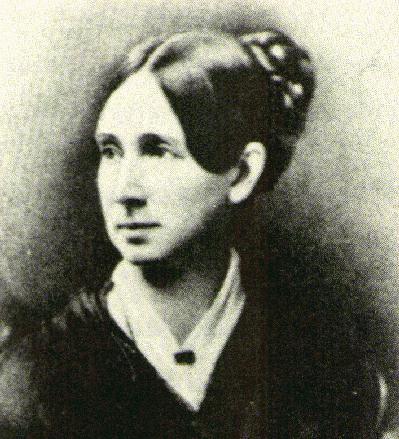
Reviews of above book:
Washington Times : [Dorothea Dix] is the story of a woman
who held that 'a wholesome moral environment, with or without physicians,
could restore the spiritual stability of the insane'...This 'moral treatment'
of insanity was based on Miss Dix's religious view of life (she was a
Unitarian). During her long life (1802-1887) she was an author of children's
books, a teacher, a prison reformer, the moral and political force behind
the creation of many mental hospitals, and superintendant of women nurses
for the Union Army during the Civil War...[Dorothea Dix is] a sound
scholarly biography of a formidable American woman.
Journal of American History : The strengths of Brown's biography are
obvious: it is impressively researched and well written; it provides insights
into Dix's career; and it offers a window into the complex cultural world
of that era. The most original part of the book lies in the detailed
analysis of Dix's failure to secure federal land grants to endow state mental
hospitals and her abortive role as superintendent of nurses during the Civil
War; both episodes illuminate the sources of her career and the fragility
of her moral ideology. Brown's biography will appeal most to scholars seeking
the define the character and ideology of mid-nineteenth-century social activism...It
is clear that Brown has made in important contribution, and future scholars
will profit from his insights.
--Gerald N. Grob
Journal of Illinois History : Dorothea Lynde Dix's singular career
to improve the condition of the mentally ill has received a great deal of
recent scholarly attention. Thomas J. Brown suggests that there is more to
be said, and he traces her life in revisionist ways, quietly amending
earlier accounts...Brown covers [her life] with rich insight and sensitivity
to his subject. He writes convincingly and well. He is well versed in the
historiography of American politics, gender relations, and social reform,
and he uses them well to place Dix in her time and role. This is an excellent
first book.
--Joel H. Silbey
Choice : The most famous American woman reformer of her time, Dorothea
Dix was a monomaniac, possessed of a personality and manner that made friends
sometimes prefer sinners to a saint. Nevertheless, Brown declines to psychologize.
Grounded in a persuasively sober reading of Dix's voluminous correspondence
and the papers of her friends...Brown stresses her commitment to the moral
imperatives of Unitarianism. His perspective is particularly helpful when
he positions within antebellum sectional conflicts over federal land policy
Dix's long campaign to get through Congress a land-grant bill to aid state
mental hospitals. And he offers a sympathetic account of Dix's Civil War
volunteer work, when her expectation of being the American Florence Nightingale
came so sadly to naught...If one must choose just one biography, his book
should have the edge.
--A. Graebner
Contemporary Review [UK] : This biography of the great American reformer
is a good reminder that not all influential women in nineteenth-century America
were seething feminists who demanded revolution or nothing...This excellent
biography uses an enormous range of materials and combines a balanced
approach with a pleasant and readable style.
Journal of the Early Republic : This well written and copiously researched
work presents a sympathetic and intimate portrait of one of the best-known
reformers in antebellum America...What Brown presents is a surprisingly intimate
portrait that still acknowledges Dix's many shortcomings--her limited
view of women's rights, her blindness on the issue of slavery, and her lingering
nativism. Despite Dix's personal limitations, however, Brown recognizes her
many successes in convincing parsimonious legislatures to build asylums
and putting the plight of the mentally ill on a national stage. Brown tells
a story that is closely focused on Dix, but also manages to reveal valuable
information about education, religion, medical professionalism, women's
history and the political quagmire of antebellum America.
--Stephan D. Andrews
New England Quarterly : In his definitive biography of 'the country's
most famous benevolent heroine,' Thomas J. Brown presents a compelling portrait
of Dix's work as an advocate for the insane. No mere account of a New England
'busybody,' Brown's careful and thoughtful biography traces the life
and times of a rigidly conventional woman who, through force of will, forged
a most unconventional career.
Book Description
Dorothea Dix was the most politically engaged woman of her
generation, which was itself a remarkable tapestry of activists. An influential
lobbyist as well as a paragon of the doctrine of female benevolence, she
vividly illustrated the complexities of the "separate spheres" of politics
and femininity. Her greatest legislative initiative, a campaign for federal
land grants to endow state mental hospitals, assumed a central role in the
public land controversies that intertwined with the slavery issues in
Congress following the Mexican War. The passage of this legislation in 1854,
and its subsequent veto by President Pierce, touched off the most protracted
effort to override a veto that had yet taken place.
An activist who disdained the women's rights and antislavery
movements, Dix, an old-line Whig, sought to promote national harmony and became
the only New England social reformer to work successfully in the lower
South right up to the eve of secession. When war broke out, she sought to
achieve as Superintendent of Women Nurses the sort of cultural authority she
had seen Florence Nightingale win in the same role during the Crimean
War. The disastrous failure of one of the most widely admired heroines in
the nation provides a dramatic measure of the transformations of northern
values during the war.
 Editorial Reviews
From Publishers Weekly
Editorial Reviews
From Publishers Weekly
With single-minded determination, Dix (1802-1887), a New England school
teacher, succeeded in drawing national attention to the appalling treatment
of the mentally ill. In this exhaustive study, Gollaher, president of the
California Health Care Institute, describes Dix's investigations of jails
and almshouses where the mentally ill were cruelly imprisoned in filthy conditions.
Her detailed reports of these visits, some dramatically embellished, resulted
in the founding of state asylums. She also campaigned unsuccessfully to have
federal land set aside for national facilities. With the onset of the Civil
War, Dix was appointed Superintendent of Women Nurses for the Union. Although
she did not want the country to break apart, Dix's compassion for the mentally
ill, according to this portrait, apparently did not extend to everyone: she
didn't believe slavery was wrong, and she held a deep prejudice against Roman
Catholics. According to Gollaher, Dix identified with the helplessness of
the mentally ill because of an abusive childhood, and her commitment resulted
in important reforms. Photos.
Copyright 1995 Reed Business Information, Inc.
From Library Journal
Dix (1802-87) has long merited a full-scale biography. Advocating a public
responsibility for the care of the mentally ill, she founded a large number
of asylums and lobbied for mental health reforms. During the Civil War, she
organized Union nurses, although she never gained the credit awarded Clara
Barton and Mary Bickerdyke. Her career offers an instructive counterpoint
to those of women abolitionists and advocates of women's rights; while she
was active in politics, she never questioned traditional gender-defined roles
in American society. Gollaher, president of the California Health Care Institute,
weaves his knowledge of mental health care throughout the text, although
here and there it is difficult to distinguish between historical analysis
and policy advocacy. Nevertheless, readers will find his rediscovery of Dix
a blend of compelling reading and evenhanded assessments, though the appeal
of this book to lay readers is limited.?Brooks D. Simpson, Arizona State
Univ., Tempe
Copyright 1995 Reed Business Information, Inc.





